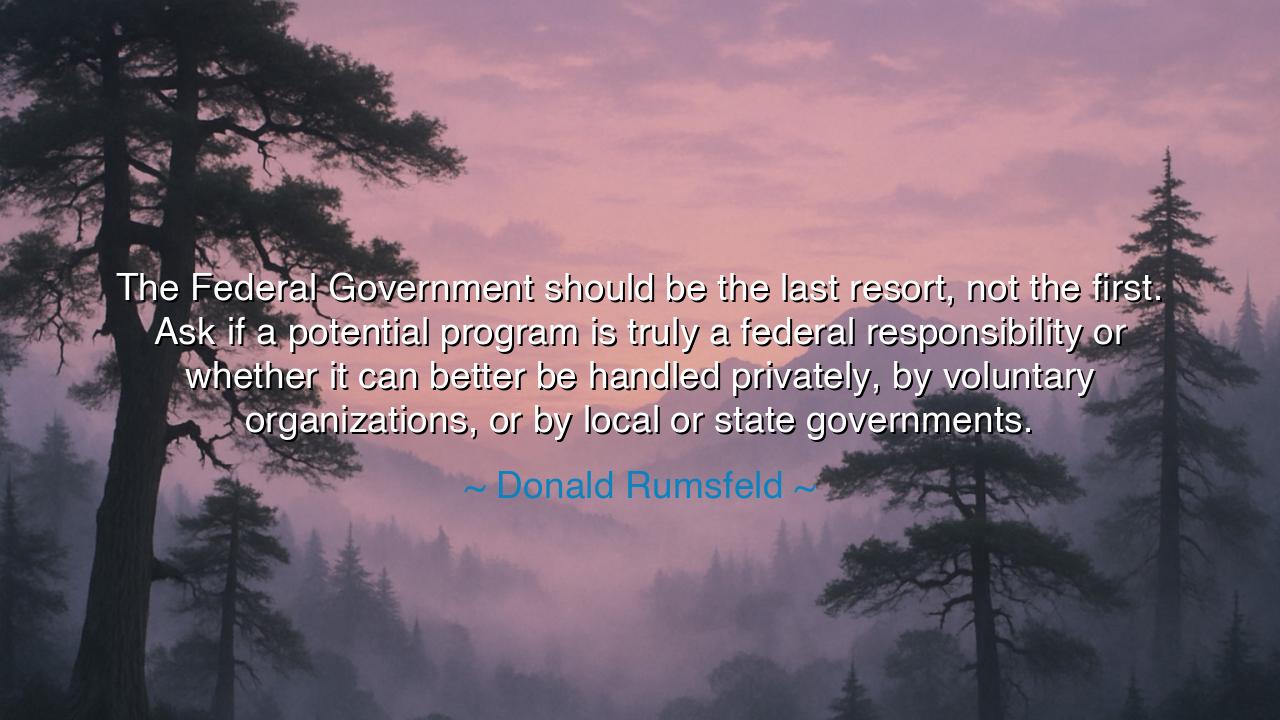
The Federal Government should be the last resort, not the first.
The Federal Government should be the last resort, not the first. Ask if a potential program is truly a federal responsibility or whether it can better be handled privately, by voluntary organizations, or by local or state governments.






When Donald Rumsfeld declared, “The Federal Government should be the last resort, not the first. Ask if a potential program is truly a federal responsibility or whether it can better be handled privately, by voluntary organizations, or by local or state governments,” he spoke to an ancient truth buried within the heart of governance — that power grows purest when it is closest to the people. These words, though uttered in the modern age, carry the echo of the founding fathers, who warned that liberty withers when authority becomes distant, vast, and impersonal. Rumsfeld’s appeal was not to dismantle government, but to restrain its reach, reminding all who lead that the strength of a nation lies not in the hands of the few who govern, but in the spirit of the many who serve, build, and give freely.
The origin of this quote comes from Rumsfeld’s long career in public service, during which he witnessed firsthand the great machinery of federal power — its triumphs, its failures, and its temptations. Having served as both a congressman and Secretary of Defense under two presidents, he understood the delicate balance between national unity and local independence. His words reflect the enduring American principle of federalism, a vision born in the 18th century when the framers of the Constitution sought to bind a fragile confederation of states into one Republic — but without extinguishing the sovereignty of the people or their communities. Rumsfeld’s caution, therefore, is both practical and moral: that centralized power, though efficient in appearance, often erodes the vitality and virtue that thrive in smaller spheres of action.
This belief has deep philosophical roots. For when responsibility is concentrated in distant halls of authority, the individual grows dependent, and with dependency comes decay — not of body, but of character. The federal government, in its grandeur and might, is not meant to be the hand that feeds every need, but the guardian that intervenes only when necessity demands it. A society that looks to the center for every solution loses the art of self-reliance; it forgets that the true measure of civilization lies not in laws passed from afar, but in the voluntary compassion of neighbors, the diligence of local leaders, and the ingenuity of private citizens. Rumsfeld’s wisdom is thus a call to awaken the sleeping strength within communities — to remind them that not every problem must be solved by decree, but can be healed by conscience.
History itself bears witness to the peril of forgetting this truth. Consider the fall of ancient Rome — a civilization that, in its early years, thrived upon the vigor of its citizens and the simplicity of its republic. Yet as centuries passed, its government grew swollen with bureaucracy, its citizens complacent, and its provinces dependent on imperial handouts. What began as a strong and self-sufficient republic became an empire of dependency, until the weight of its own excess crushed it. The same pattern has visited nations in every age: when power centralizes, initiative dies; when government replaces virtue, freedom fades. Rumsfeld’s counsel, though spoken in modern times, is a shield against that timeless fate.
But his message is not one of withdrawal or cold neglect. He does not say government should abandon the people, but that it must trust them. For the heart of democracy is participation — the belief that each citizen bears a fragment of responsibility for the common good. The local and state governments, the private institutions, the volunteers and innovators — these are not rivals to the federal government, but its foundation. When they act with courage and integrity, the need for federal intervention diminishes; when they fail or falter, central power expands to fill the void. Thus, Rumsfeld’s words are both a warning and a challenge: that every act of civic virtue, however small, keeps the flame of liberty alive.
We may see this principle at work in the countless acts of heroism that rise not from government decree, but from the will of ordinary people. After the devastation of Hurricane Katrina, for example, even amid the failures of federal response, thousands of churches, businesses, and local groups became lifelines to those in need. Neighbors opened their doors, strangers became rescuers, and compassion bridged the gaps bureaucracy could not cross. It was a living testament to Rumsfeld’s truth — that the human spirit, uncoerced and uncommanded, often accomplishes more than systems of power ever can.
The lesson in this quote is profound: do not look always to distant authorities for salvation. The power to heal, to build, and to govern wisely begins with you — with your home, your city, your conscience. Ask not first what the government can do, but what you can sustain without it. For when citizens act with initiative, charity, and wisdom, government becomes lighter, freer, and nobler in its true purpose: not to rule the people, but to serve them when all else fails.
And so, let Rumsfeld’s words be remembered not as a rebuke to government, but as a hymn to human responsibility. A great nation does not rise from the size of its institutions, but from the greatness of its citizens. When the people live with strength and self-governance, the state becomes merely the last resort — a guardian resting in peace, called forth only when the courage of the many meets its limits. For as the ancients taught: the highest form of order is not imposed from above, but grown from within — and a people who govern themselves wisely shall never be truly governed by another.






AAdministratorAdministrator
Welcome, honored guests. Please leave a comment, we will respond soon